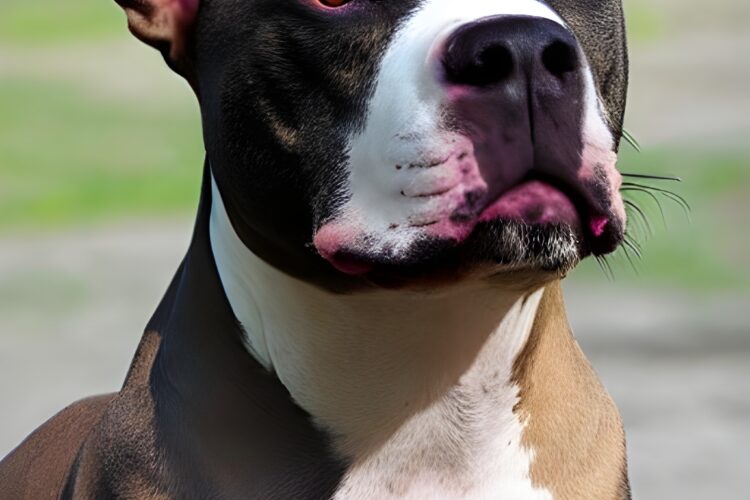Aggression in American Pit Bulls is a complex issue with multiple contributing factors, including genetics, early socialization, training, and environmental factors. While some American Pit Bulls may be prone to aggressive behavior, it is not an inherent trait of the breed, and responsible ownership, positive training, and proper socialization can reduce the likelihood of aggressive behavior in any breed of dog.
Long Answer
The perception that American Pit Bulls are inherently aggressive is a controversial topic that has been debated for decades. It is important to understand that aggression in dogs is a complex issue, and there is no single factor that can fully explain it. Several factors may contribute to aggressive behavior in American Pit Bulls, including genetics, early socialization, training, and environmental factors.
Firstly, genetics may play a role in the development of aggressive behavior in American Pit Bulls. While genetics are not the sole determining factor in a dog’s temperament, they can influence certain traits, including aggression. Some breeders may select for aggressive behavior traits, leading to the production of dogs with a predisposition towards aggression.
Additionally, it is important to note that not all American Pit Bulls exhibit aggressive behavior. Many American Pit Bulls are well-socialized and make excellent family pets. However, due to their strength and size, an aggressive American Pit Bull can cause severe harm, which is why they may have a reputation for being dangerous.
Early socialization is another important factor in a dog’s development. Socialization involves exposing puppies to various people, animals, and environments in a positive and controlled manner. Puppies who are not socialized properly may develop fear and aggression towards unfamiliar people, animals, or situations. American Pit Bulls who are not socialized properly may be more likely to exhibit aggressive behavior towards strangers, other animals, or in unfamiliar environments.
Training is another important factor that can influence a dog’s behavior. Positive reinforcement training methods can help to reinforce desirable behaviors and discourage undesirable behaviors, including aggression. Conversely, punishment-based training methods can lead to fear and anxiety, which may increase the likelihood of aggressive behavior.
Environmental factors can also play a role in a dog’s behavior. Dogs who are kept in high-stress environments, such as cramped living conditions or constant exposure to loud noises, may be more likely to exhibit aggressive behavior. Additionally, dogs who have been abused or neglected may be more prone to aggression.
It is important to note that breed-specific legislation, which targets certain breeds of dogs, including American Pit Bulls, as inherently dangerous and places restrictions on ownership, is a controversial and often ineffective approach to addressing aggressive behavior in dogs. Many experts argue that breed-specific legislation fails to address the root causes of aggression and unfairly targets responsible owners of well-behaved dogs.
In conclusion, while some American Pit Bulls may be prone to aggressive behavior, it is not an inherent trait of the breed. Multiple factors, including genetics, early socialization, training, and environmental factors, can contribute to a dog’s behavior. Responsible ownership, positive training methods, and proper socialization can all help to reduce the likelihood of aggressive behavior in any breed of dog.

Words Worth Noting
American Pit Bull, aggression, genetics, socialization, training, environment, breed-specific legislation, dog behavior, controversial topic, responsible ownership, positive reinforcement, punishment-based training, fear, anxiety, neglect, abuse, breed traits, dangerous breeds, stereotypes, public safety, risk assessment, behavior modification, temperament, animal welfare, human-dog interactions, prejudice, fearfulness, dangerous dog laws, dog bites, canine aggression.
Hashtags For Social Media
#AmericanPitBull #Aggression #Genetics #Socialization #Training #Environment #BreedSpecificLegislation #DogBehavior #ControversialTopic #ResponsibleOwnership #PositiveReinforcement #PunishmentBasedTraining #Fear #Anxiety #Neglect #Abuse #BreedTraits #DangerousBreeds #Stereotypes #PublicSafety #RiskAssessment #BehaviorModification #Temperament #AnimalWelfare #HumanDogInteractions #Prejudice #Fearfulness #DangerousDogLaws #DogBites #CanineAggression
Related Questions, Words, Phrases
why are american pit bulls so aggressive? | why do american pit bulls exhibit aggressive behavior? | what makes american pit bulls aggressive? | are american pit bulls naturally aggressive? | what factors contribute to the aggression in american pit bulls? | are american pit bulls more aggressive than other breeds? | what are the reasons behind the aggressive behavior in american pit bulls? | what causes american pit bulls to be aggressive? | do american pit bulls have a tendency towards aggression? | is aggression an inherent trait in american pit bulls? | what is the source of american pit bulls’ aggression? | is there a genetic component to american pit bulls’ aggression? | how much of american pit bulls’ aggression is due to genetics? | what role does early socialization play in american pit bulls’ aggression? | how does training impact american pit bulls’ aggression? | can the environment cause american pit bulls to be aggressive? | are american pit bulls only aggressive towards humans? | how do environmental factors contribute to american pit bulls’ aggression? | why do some people believe that american pit bulls are aggressive by nature? | is it possible to prevent aggression in american pit bulls? | what should be done to reduce aggression in american pit bulls? | are all american pit bulls aggressive? | what percentage of american pit bulls exhibit aggressive behavior? | how can responsible ownership reduce aggression in american pit bulls? | what are some effective training methods to prevent aggression in american pit bulls?






